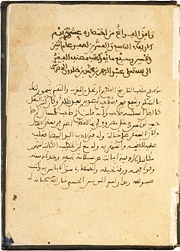al-Muqaddimah
The Muqaddima or “Introduction to Universal History”
The Muqaddima or "Introduction to Universal History", Ibn Khaldun's most well-known and most representative work, was written over a period of four years. Muqaddima is an encyclopaedic work in which the subjects he deals with are presented in a perfectly ordered fashion in an introduction and six long chapters (abwab) which are divided up into several smaller sections.
A History of the Berbers
Universal History
In this work Ibn Khaldun presents us his own conception of History by dealing with the different civilizations, dynasties and state powers, cities and villages, Arts or Sciences. He analyses a multitude of the ideological, political, economic and sociological phenomena that are to be found in the complex framework of human society. The Muqaddima presents a central guiding theme based on a wide variety of reliable sources. An important aspect of the Muqaddima is that it provides a number of general concepts that can be applied to any series of historical events at different times or in different places. The objective of Ibn Khaldun's study of societies was above all to carry out a historical analysis. This historian, who was also a philosopher, economist and sociologist, backs up the history, the tangible facts and distinguishes between the concise narration of events (the objective of historiography) and the philosophical interpretation of these same events. Ibn Khaldun's work has been conserved on several manuscripts some of which were written when the author was still alive.
It is highly significant that a large number of manuscripts of this work have been conserved. The author finished his study in 1378 and continued to add to the text until two years before his death.
Editions in Arabic began to appear in the nineteenth century. The first Arabic version of the Muqaddima was printed in Bulaq, near Cairo in 1857. This edition served as the basis for almost all subsequent Oriental editions. The first complete European edition was published in Paris in 1858.
Source: El Legado Andalusí Foundation




